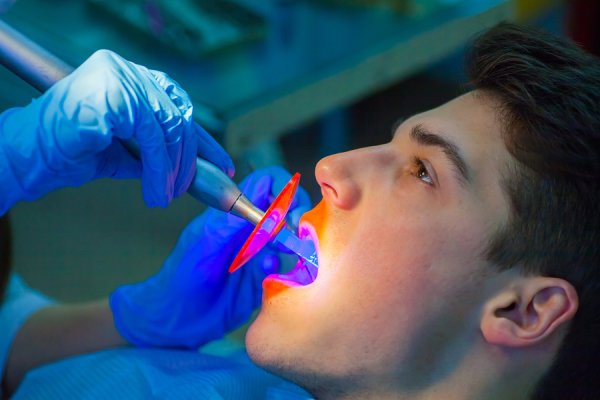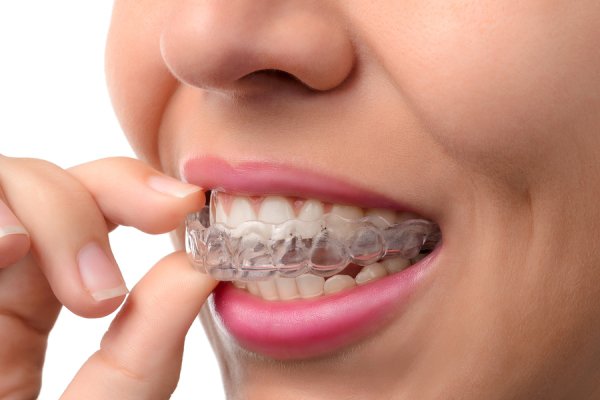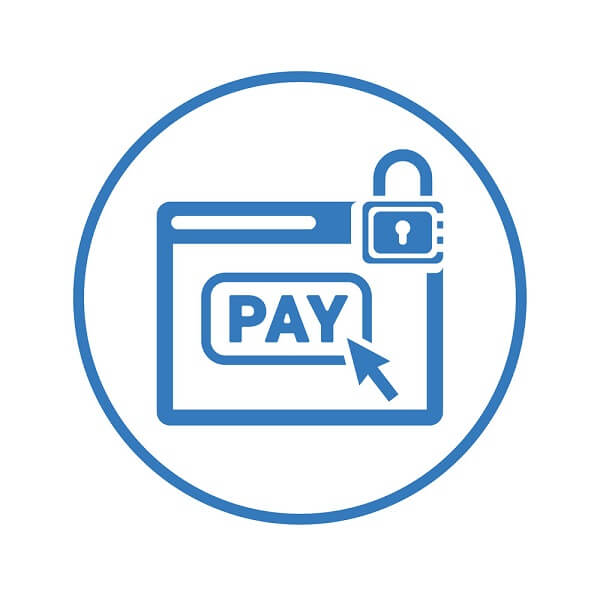-
Treating Gum Disease with Lasers

Laser dentistry is an increasingly popular way for Dr. Spalitto, a dentist near St. Louis, to treat gum disease. Gum disease can pose serious risks to your oral and overall health. When plaque accumulates between the teeth and along the gumline, it can solidify into tartar. Plaque causes both cavities and gum disease. If untreated by a dentist, gum disease leads to tender, red, and bleeding gums. It can also cause tooth loss. Fortunately, gum disease can be treated with laser dentistry. Read on to learn more how laser dentistry treats gum disease.
Targeted Method
Laser dentistry is preferred by many dentists who treat gum disease because it targets only the affected tissue. With traditional techniques, a dentist uses tools to treat problem areas. Unfortunately, these tools can cause damage to nearby tissues and lead to longer recovery times. With laser dentistry, a dentist is able to reshape the soft gum tissue. The entire procedure is almost completely pain free and requires substantially less recovery time.General Steps
When it comes to treating gum disease or periodontal disease, laser dentistry is a four-step process. First, your dentist will pre-test bacteria to determine how far the disease has progressed. Next, he or she will use a laser to de-contaminate deep gum pockets. Finally, the laser dentistry treatment is executed with a microscope. At the end, your dentist will test your gums to make sure the gum disease has been resolved.Additional Benefits
In addition to sparing nearby healthy gum tissue, laser dentistry offers various benefits for gum disease treatment. By using a laser, your dentist can eliminate gum bleeding immediately. Your dentist can also reduce or completely fix loose teeth. Laser dentistry ensures that healthy bone and ligament tissue regenerate. Finally, when compared with gum surgery, laser dentistry minimizes swelling.Find out more about laser dentistry by speaking with a dentist today. Call Dr. Spalitto at West County Dental at (314) 821-2712.
-
A Better Smile with Invisalign

When it comes to family dentistry in St. Louis, Invisalign is Dr. Spalitto’s preferred technique for treating misaligned teeth. Invisalign can help patients of all ages achieve the smiles of their dreams.
Family dentistry has long relied upon braces to straighten teeth. If your teeth are misaligned, gapped, or overlapping, you may suffer serious oral and overall health problems. Misaligned teeth are difficult to clean, which means you can develop cavities and gum disease from accumulated plaque. When a dentist uses Invisalign to straighten teeth, it ensures that you will have a much healthier smile. Invisalign is also much easier to care for than traditional metal braces. Simply remove the clear aligners before eating or brushing your teeth. Because you have no painful metal brackets to work around, brushing and flossing are more effective. Additionally, Invisalign does not require your dentist to perform constant adjustments. Best of all, almost no one will be able to tell you are wearing braces. At the end of your Invisalign treatment, you will have a beautiful smile.
Learn more about Invisalign by calling Dr. Spalitto of West County Dental at (314) 821-2712 today.
-
Signs You May Need a Root Canal

Root canals in St. Louis are routine and completely safe procedures . While some people feel understandably anxious about the idea of root canals, an experienced dentist like Dr. Spalitto can guide you through the procedure and make sure you feel comfortable throughout. Root canals are necessary if a tooth’s inner tissue has become severely infected and requires cleaning and removal. A root canal can often preserve the natural tooth, as long as the infection is treated right away. Keep reading for some common signs you may need a root canal, including severe pain, a sensitive tooth, and swollen gums.
Severe Pain
Root canals are most often signified by a severe toothache. A root canal is required when there are problems with the tooth’s nerve and soft inner pulp. While root canal pain may be dull and relatively moderate at first, the pain becomes more severe as the infection worsens. Root canal pain does not improve on its own or simply go away. Once the infection has set in, it will continue to progress until it is treated by a dentist.Sensitive Tooth
A tooth that is especially sensitive to hot, cold, or sweet foods or drinks is another sign you may need a root canal. Tooth sensitivity can occur for many reasons. Some people have naturally sensitive teeth, while others suffer from sensitivity because the outermost enamel has worn off. Sensitive teeth may also indicate cavities. However, if you experience extreme sensitivity, especially when biting down, you may need a root canal.Swollen Gums
Swollen gums can also indicate that you need root canal treatment. When the tooth becomes infected, the nearby sensitive gum tissues can become inflamed. Your gums may feel red or tender or look swollen. However, these are also symptoms of gum disease, so be sure to visit a dentist to rule out the possibility of gingivitis.If you have been experiencing the above symptoms and are concerned you may need a root canal, contact Dr. Spalitto and the team at West County Dental by calling (314) 821-2712 today.
RECENT POSTS
categories
- Uncategorized
- crowns
- dental veneers
- dentists
- full service dental practice
- porcelain veneers
- same day crowns
- Dental Cosmetic Surgery
- Dental Implants
- Dentistry
- Dentist Review
- Laser Dentistry
- Root Canal
- Sedation Dentistry
- Dentures
- Cleanings
- Teeth Whitening
- Abscessed Teeth
- Cosmetic Dentistry
- Infographic
- Cavities
- Sealants
- Gum Recession
- Periodontal Disease
- Dental Health
- Family Dentistry
- Dental Emergency
- Invisalign
- Filling
- Same Day Dental Procedures
- Gum disease
- Sleep Apnea
Archives
2022
2021
- December (2)
- November (1)
- October (3)
- September (2)
- August (2)
- July (2)
- June (2)
- May (2)
- April (2)
- March (2)
- January (2)
2020
2016
2015
- December (4)
- November (3)
- October (3)
- September (4)
- August (4)
- July (4)
- June (4)
- May (3)
- April (3)
- March (4)
- February (5)
- January (6)

